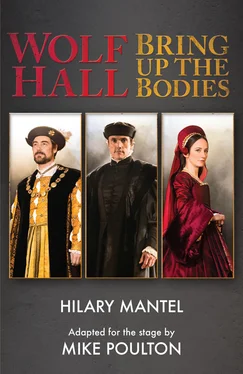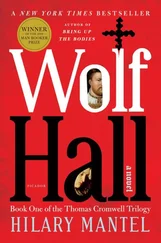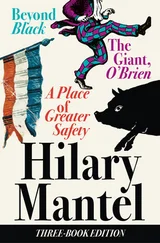It might be thought that the sheer length of the two books would present problems. I never thought so. The way a novel is structured cannot be reproduced on the stage – there could be no question of simply putting two whole novels on their feet. They had to be completely re-imagined as plays. The immediate questions were what would be lost, and what, if anything, would be gained in the stage versions? We set out to convert our difficulties into opportunities.
The content of the books cannot be condensed. You can’t repaint the jewel-like miniature scenes of the original with broad brushstrokes. You can’t ask an actor to play a summary of events – actors need detail. Adaptation is the process of choosing vital and dramatic details from the novels and relaying them like stepping stones along a clear route from a beginning, through a middle, and then in a headlong rush to the end. Pace is everything. To falter on stepping stones is to end up in the river.
Losses and gains? Strong characters are the life of Hilary’s books. So in terms of character, nothing could be changed. I wanted Cromwell, Wolsey, Anne and Henry – and all the other powerful characters we’ve included – to leap alive and fully formed from the pages of the books onto the stage of the Swan. If this could be accomplished, I felt the spirit of the book would remain intact. Incident has been lost. Obviously, we can’t reproduce every scene and every conversation we read in the original work, so we’ve had to be highly selective. There’s no doubt that readers will have favourite scenes that are not shown in the plays. But the story should gain a different sort of pace and drive in the playing. In the novels it’s as if we’re standing at Cromwell’s shoulder observing what he observes and sharing his thoughts. Seeing events through Cromwell’s eyes was the prime requirement of the adaptation. Sometimes what works perfectly in a novel won’t read in a live performance. Some of the most memorable images in the books are formed in Cromwell’s head: his reflections, his plotting, his private anguish, and, most of all, his barely contained laughter. Cromwell is very often on the point of dissolving into mirth. We decided at an early stage not to indulge in ‘pieces to camera’ – monologues delivered chorus-like by Cromwell to the audience. So in working with RSC actors through the drafts – there have been nine – we decided to give Cromwell two confidants, one from his household, one from Court, with whom he can share his thoughts: Rafe Sadler and Thomas Wyatt. And we have also provided him with a few completely new scenes which have no equivalent in the books.
Once the characters were comfortable, and sure-footed, on stage, it became possible to give them their heads in order to drive the plotting forward. There are many fewer characters in the plays than in the novels – a cast of one hundred and thirty would overcrowd the intimate playing space of the Swan – but other characters have risen to prominence and have been given more to do in the telling of the story. Christophe, for example, in some ways a model of Cromwell’s younger self, seems to be everywhere, and is usually up to mischief.
Our choice of theatre – the Swan is always my first choice – suggested, or rather insisted upon, a particular tone and style for our two plays. It’s a small space with a deep thrust stage. Wherever you sit, you feel you’re part of the action. Instead of looking over Cromwell’s shoulder, as in the books, throughout the plays you’re on stage with him. And he is on stage all the time. There’s spectacle – masques at Court, dances, courts of inquiry, even a coronation and a deer hunt. There’s detail – quiet scenes at home in Austin Friars, a fire in the Queen’s chambers in the middle of the night, scenes of intrigue and interrogation, and ghostly visitations. But there are no elaborate stage tricks – no revolves, lifts, nor clever-clever scene changes – everything has to be accomplished by the actors. They have their voices, their costumes, music, lighting, props, and an infinitely flexible playing space that can carry us in seconds from King Henry’s bedchamber, where he huddles for warmth over a fire, to a cold night on a boat in the middle of the River Thames. The Swan is the perfect theatre for storytelling. I’d previously worked through the twenty and more stories of The Canterbury Tales there, and there were valuable lessons to be learned from that experience. As I re-read Wolf Hall , and later Bring Up the Bodies , many more times, I tried to gear scenes to what I knew would work well in the Swan. And I knew – from touring Canterbury Tales – that if a play works in the Swan, it will play well in other theatres.
In bringing these two great novels to the stage, I have tried to replace the private pleasure of reading with the communal excitement of live theatre. When you read Wolf Hall , Cromwell and company get inside your head – they look as much through your eyes as you look through theirs. When you watch Wolf Hall , I hope we’re offering you a completely different experience – it should be like stepping into the world of Wolf Hall and Bring Up the Bodies – being rowed down the Thames with a dejected Wolsey, sitting at dinner with the King, chasing rats with Christophe, being in the Tower with Thomas More, or waiting to take a turn at swinging the headsman’s sword.
Конец ознакомительного фрагмента.
Текст предоставлен ООО «ЛитРес».
Прочитайте эту книгу целиком, купив полную легальную версию на ЛитРес.
Безопасно оплатить книгу можно банковской картой Visa, MasterCard, Maestro, со счета мобильного телефона, с платежного терминала, в салоне МТС или Связной, через PayPal, WebMoney, Яндекс.Деньги, QIWI Кошелек, бонусными картами или другим удобным Вам способом.








![Theresa Cheung - The Dream Dictionary from A to Z [Revised edition] - The Ultimate A–Z to Interpret the Secrets of Your Dreams](/books/692092/theresa-cheung-the-dream-dictionary-from-a-to-z-r-thumb.webp)



